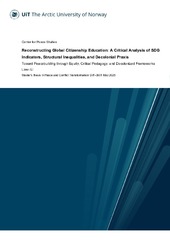| dc.contributor.advisor | Nils Vidar Vambheim | |
| dc.contributor.author | Li, Liwei | |
| dc.date.accessioned | 2025-07-18T03:01:42Z | |
| dc.date.available | 2025-07-18T03:01:42Z | |
| dc.date.issued | 2025 | |
| dc.description.abstract | This study critiques the implementation of Global Citizenship Education (GCED) and Education for Sustainable Development (ESD) in the light of the Sustainable Development Goals (SDGs), focusing on the limitations of SDG indicators 4.7.1, 12.8.1 and 13.3.1. The analysis of policy frameworks, the data from International Civic and Citizenship Education Study (ICCS) and UNESCO/UN metadata led to three core conclusions. First, current SDG indicators prioritize apparent compliance but fail to require critical engagement with structural inequalities, which risks the exploitation of education for economic or political agendas. Second, the ambiguity in these indicators undermines their usefulness for policymakers and educators, hence the need for clearer criteria. Third, the greater focus on knowledge transfer rather than critical empowerment has led to the creation of a phenomenon in which students with higher levels of civic knowledge are less willing to engage in transformative political action.
The study identifies methodological limitations, including a reliance on Western-centered ICCS indicators that ignores non-Western paradigms of civic engagement (e.g., the Indigenous Land Rights Movement) and insufficient integration of non-European theoretical frameworks. Future research must address these gaps by decolonizing assessment tools, integrating critiques of power structures into the SDG framework, and advocating for hybrid pedagogies that balance competency- and consciousness-oriented approaches. Without such reforms, GCED/ESD runs the risk of perpetuating passive citizenship rather than developing the “critical actors” that are essential to global justice.
Keywords global citizenship education, sustainable development goals, decolonization education, SDG indicators 4.7.1/12.8.1/13.3.1. | |
| dc.description.abstract | This study critiques the implementation of Global Citizenship Education (GCED) and Education for Sustainable Development (ESD) in the light of the Sustainable Development Goals (SDGs), focusing on the limitations of SDG indicators 4.7.1, 12.8.1 and 13.3.1. The analysis of policy frameworks, the data from International Civic and Citizenship Education Study (ICCS) and UNESCO/UN metadata led to three core conclusions. First, current SDG indicators prioritize apparent compliance but fail to require critical engagement with structural inequalities, which risks the exploitation of education for economic or political agendas. Second, the ambiguity in these indicators undermines their usefulness for policymakers and educators, hence the need for clearer criteria. Third, the greater focus on knowledge transfer rather than critical empowerment has led to the creation of a phenomenon in which students with higher levels of civic knowledge are less willing to engage in transformative political action.
The study identifies methodological limitations, including a reliance on Western-centered ICCS indicators that ignores non-Western paradigms of civic engagement (e.g., the Indigenous Land Rights Movement) and insufficient integration of non-European theoretical frameworks. Future research must address these gaps by decolonizing assessment tools, integrating critiques of power structures into the SDG framework, and advocating for hybrid pedagogies that balance competency- and consciousness-oriented approaches. Without such reforms, GCED/ESD runs the risk of perpetuating passive citizenship rather than developing the “critical actors” that are essential to global justice.
Keywords global citizenship education, sustainable development goals, decolonization education, SDG indicators 4.7.1/12.8.1/13.3.1. | |
| dc.identifier.uri | https://hdl.handle.net/10037/37768 | |
| dc.identifier | no.uit:wiseflow:7269056:61800927 | |
| dc.language.iso | eng | |
| dc.publisher | UiT The Arctic University of Norway | |
| dc.rights.holder | Copyright 2025 The Author(s) | |
| dc.rights.uri | https://creativecommons.org/licenses/by/4.0 | en_US |
| dc.rights | Attribution 4.0 International (CC BY 4.0) | en_US |
| dc.title | Reconstructing Global Citizenship Education: A Critical Analysis of SDG Indicators, Structural Inequalities, and Decolonial Praxis | |
| dc.type | Master thesis | |


 English
English norsk
norsk
